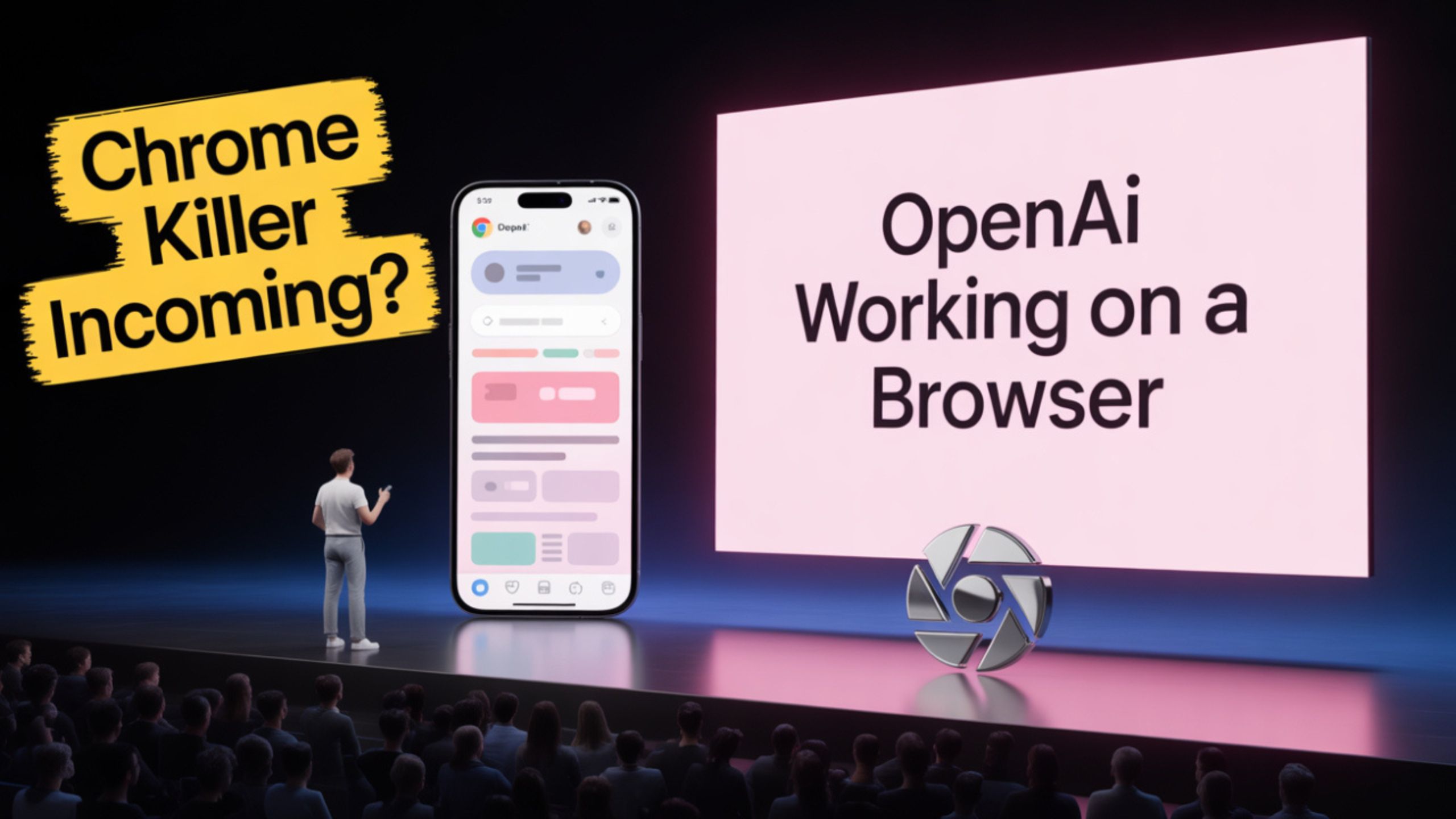Next-Gen AI Browser– The web browsing landscape is bracing for a seismic shift. OpenAI, renowned for its transformative AI tools like ChatGPT, is reportedly in the advanced stages of developing its AI-powered web browser. This isn’t just another Chromium-based browser; it’s poised to redefine how humans interact with the internet. With features that deeply integrate AI agents, this upcoming browser could challenge the dominance of Google Chrome, which has long stood as the industry titan.
The Rise of OpenAI’s Web Browser: Chromium-Based, but Different
According to recent leaks and reports, OpenAI’s browser is being built on the Chromium framework, the same open-source base that powers Chrome, Microsoft Edge, and Brave. However, this isn’t just a Chrome clone.
The key difference? OpenAI’s version is intelligently layered with AI capabilities, allowing users to interact with the browser through a conversational chat interface, much like ChatGPT. Instead of typing a web address or search query, you may ask the browser to perform actions, like booking flights, filling out forms, or navigating to a specific product page.
Built for AI Agents: Smarter, More Efficient Web Interactions
The browser’s most game-changing feature is its native support for AI agents, which is tightly integrated with OpenAI’s Operator platform. These agents aren’t passive tools. They can:
- Autonomously execute tasks
- Analyze your browsing habits
- Fill out forms on your behalf
- Purchase products or book services
- Extract data from pages in real time
OpenAI aims to create a hyper-personalized digital assistant that understands your preferences, behaviors, and intent without requiring repeated instructions by granting the browser access to your browsing history.
This interaction doesn’t just make browsing faster; it potentially removes the need to “browse” in the traditional sense.
The Chat Interface: A Radical UX Overhaul
Instead of navigating through multiple links or tabs, OpenAI’s browser may centralize the user experience within a chat-style interface, much like how you interact with ChatGPT.
Want to visit a news site? You ask.
Need to compare prices for a product? Just say so.
Want to summarize a long blog post? The browser can do it without ever opening the whole page.
This marks a significant shift from traditional URL typing and tab management to conversational browsing, which may appeal especially to mobile users and productivity-focused professionals.
Chrome’s Monopoly Under Real Threat?
Google Chrome holds over 65% of the global browser market, with its speed, stability, and ecosystem integration leading the charge. However, Chrome’s innovation curve has flattened in recent years, focusing more on security and integration than core browsing UX changes.
OpenAI’s browser, with deep AI automation and personalization, directly threatens Chrome’s status quo by offering a different kind of browsing—one that’s proactive, not reactive.
Moreover, ChatGPT’s massive popularity, fueled by OpenAI’s brand equity, gives it a huge marketing advantage. Users are already familiar with OpenAI’s conversational interface, making adoption frictionless.
Data Collection: A Double-Edged Sword
A key (and controversial) part of this development is OpenAI’s intentional pursuit of user data. According to insider reports, the company built a standalone browser—rather than just an extension—to have more direct access to user interactions and behavioral data.
This raises both opportunities and concerns:
Opportunities:
- Improved personalization
- More accurate AI training data
- Tailored web experiences
Concerns:
- Privacy risks for users
- Potential for data misuse
- Increased dependency on AI recommendations
Yet in today’s digital ecosystem, where most tech giants already track web activity, many users may find the trade-off worth it for the benefits of convenience and intelligence.
How OpenAI Could Redefine Web Search and Navigation
OpenAI’s browser won’t replace Chrome—it could redefine web search.
By embedding AI agents directly in the browser, OpenAI is creating a world where:
- Traditional search engines become less necessary
- Information is pre-sorted and summarized
- Search results are contextualized instantly
- Users no longer need to sift through ten blue links
The AI becomes the middle layer between the user and the web, filtering out noise and delivering only the most relevant output, just like a human assistant.
Developer Ecosystem and Future Integrations
OpenAI’s browser will eventually support third-party extensions and AI plugins like the current ChatGPT plugins. This opens the door to:
- E-commerce platforms integrating AI shopping bots
- Financial dashboards pulling real-time stock insights
- Travel companies allowing one-command vacation bookings
- Web accessibility tools tailored to individual needs
By attracting developers to build intelligent tools within its ecosystem, OpenAI can scale faster than traditional browsers ever could.
Mobile Optimization and Cross-Platform Sync
Although not officially confirmed, OpenAI’s browser will likely be cross-platform, with Windows, macOS, Android, and iOS apps. Given its AI-centric architecture, the mobile version could be even more powerful, enabling hands-free browsing via voice prompts, gesture recognition, or chat.
This could outshine Chrome’s mobile browser experience, which remains static primarily and lacks intelligent in-browser automation.
Wrap Up: Is This the Beginning of Chrome’s Downfall?
While Chrome isn’t fading anytime soon, its dominance is finally being challenged—not by another traditional browser, but by a fundamentally different product. OpenAI’s AI-powered browser represents a philosophical shift in how we interact with the internet, from passive clicking and typing to active, intelligent dialogue with a machine capable of interpreting and fulfilling complex requests. It’s not just a threat to Chrome. It warns the entire browser industry: innovate or become obsolete.

Selva Ganesh is a Computer Science Engineer, Android Developer, and Tech Enthusiast. As the Chief Editor of this blog, he brings over 10 years of experience in Android development and professional blogging. He has completed multiple courses under the Google News Initiative, enhancing his expertise in digital journalism and content accuracy. Selva also manages Android Infotech, a globally recognized platform known for its practical, solution-focused articles that help users resolve Android-related issues.




AI browsers can help break language barriers online. Can’t wait to see how global the new experience feels!
The future is bright for AI and web browsers. Kudos to OpenAI for leading innovation in this space!
AI navigation sounds intriguing. I’m eager for a smarter and faster browser that adapts to my needs!
Will it sync across all my devices? That would make a huge difference in daily use.
Accessibility features powered by AI could help so many users. Really hoping for a smooth release!
Customizing the browser experience with AI sounds awesome. Can’t wait to set my own smart preferences!
Hoping this will help me find accurate information faster. AI-powered search is my favorite feature!
I’d love to see better voice integration with AI. Browsing hands-free could become the norm soon!
It’s exciting to see where internet navigation is heading. AI has the potential to make surfing seamless.
Wonder if this browser will help organize tabs better. AI recommendations while browsing could be amazing!
The web is overdue for a major update. Excited to see smarter features in browsing!
Can’t wait to see how well it integrates with other services. Hopefully, it supports extensions too.
If anyone can reinvent browsing, it’s OpenAI. This is going to shake up the tech world!
Speed and security are my priorities when choosing a browser. Let’s hope OpenAI delivers both!
This could be so helpful for research and school projects. AI tools are really making life easier.
I wonder how it will compare to Chrome and Edge. Giving users more AI power is always a win!
I hope it can block annoying pop-ups and ads automatically! AI should bring smart content filtering.
An AI browser sounds like the future of online surfing. Can’t wait to see how it performs in real life.
I’m curious about the privacy features of this new AI browser. Hope it protects user data well.
OpenAI never fails to innovate. This browser is going to be a game-changer!
The prospect of an AI-powered browser is fascinating. It might make searching for info so much more intuitive.
This AI browser could totally change the way we browse the internet. Looking forward to trying it out!